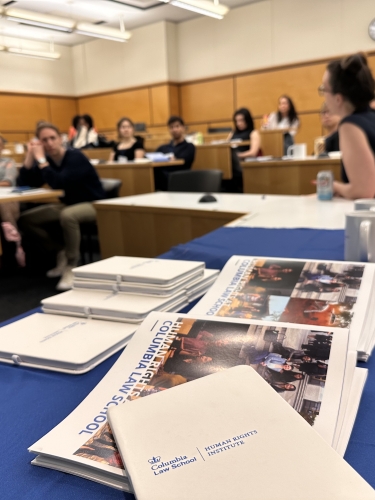
About the Program
The 1L Advocates Program (1LAP), unique to Columbia Law School, is a flagship initiative of the Human Rights Institute (HRI) and the student-led Columbia Law Students Human Rights Association. Founded in 2017, 1LAP supports incoming first-year J.D. students with a strong interest in human rights through a structured, community-driven experience designed to jumpstart long-term engagement with or careers in human rights law.
Selected Fellows in the program will receive:
- Mentorship and community: One-on-one and group mentorship from Columbia Law faculty, practitioners, alumni, and upper-year students.
- Specialized human rights seminars: Bi-monthly sessions with leading advocates and academics, covering key issues in human rights, including law, institutions, advocacy strategies, and critiques.
- Hands-on human rights work: Opportunities to do real human rights work, including with NGOs and the United Nations.
- Site visit: Trip to NYC-based human rights organization to learn directly from professionals in the field.
The program is designed for 1Ls, to set them up for success in human rights through their JD and postgraduation. Many 1LAP graduates have earned fellowships and launched careers in public interest law, international institutions, and advocacy organizations.
The program fosters inclusivity and community, and prior experience is not required. We strongly encourage applications from students of all backgrounds and levels of experience.
****
FAQs
Who is eligible to apply?
All incoming first-year J.D. students with an interest in and commitment to human rights are encouraged to apply. Prior experience in human rights is not a prerequisite for admission.
Can I apply to this Program and other Columbia programs?
Yes, you can apply to, and participate in, both the 1L Advocates Program and other initiatives, including the The Max Berger ’71 Public Interest/Public Service Fellows Program. Applications are reviewed separately and admission into one program does not impact another.
What type of programming is offered as part of 1LAP?
In addition to fall orientation, social events during the year, and a celebratory dinner in April, 1L Advocates will participate in roughly six seminars tailored to cover timely topics in the human rights field. Recent seminars, taught by leading human rights advocates, have covered issues such as human rights law, human rights strategies and tactics, critiques of human rights, career pathways, and building well-being and resilience.
What kind of human rights work can I take on during the 1L year?
1L Fellows are expected to dedicate a portion of their time during 1L to a human rights or social justice-related activity. This commitment can take myriad forms, such as being a part of a social justice-oriented student initiative, volunteering with an NGO, conducting human rights work through HRI and the Clinic, or doing a caravan. The 1L curriculum is a demanding experience, and the 1L Advocates program was designed with this reality in mind.
Contact
If you have any questions about the 1L Advocates Program, please write to us at [email protected]
Our Current Cohort:
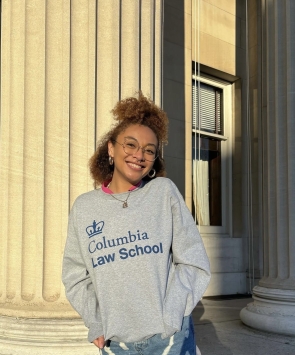
Alexis Jade Ferguson
Home Country: United States of America
What motivated your decision to join the 1L Advocates Program at Columbia Law School?
I was motivated to engage in a diverse community of peers dedicated to exploring lawyering as an avenue for social justice and systemic reconfiguration. I hoped to contribute to critical discourse on the role of legal regimes in informing socioeconomic power imbalances alongside colleagues committed to uplifting marginalized communities and their often silenced narratives. I was inspired by the ground-breaking advocacy efforts and clinical scholarship by both the HRI and its alumni-ambassadors and wished to convene with like-minded change agents and mentors seeking to theorize solutions to pressing human rights issues.
What human rights issues do you care about? What work have you done before coming to Columbia?
I am passionate about civil rights, especially pertaining to combating police brutality, political imprisonment, and labor injustice. I spent a summer in Alabama researching racial disparities in the administration of capital punishment and possess a wide variety of experience in grassroots organizing, civil impact litigation, and critical criminological research. From working at DC Jobs with Justice, Collective Action for Safe Spaces, and the Institute for Women’s Policy Research to Black Girls Vote, Solomon Law Firm, and the Telluride Association, I’ve unearthed interests in exploring the place for transformative justice and critical race theory in contemporary legal systems.
What do you hope to do when you graduate from Columbia?
I hope to be a capital defense attorney working to fight the death penalty in the South and advocating for youth of color subject to life without parole. I hope to work for a non-profit dedicated to coupling legal services for indigent defendants with radical educational advocacy and holistic re-entry programming. I am also inspired by organizations committed to exploring victim-offender mediation practices and problematizing notions of culpability, accountability, and justice in consciousness-raising groups for those formerly incarcerated.

Alisha Arshad
Home Country: United States of America
What motivated your decision to join the 1L Advocates Program at Columbia Law School?
Growing up, I witnessed the struggles of women, children, and refugees in my community and abroad, which inspired my passion for human rights advocacy. Then, throughout college, I explored human rights through various international organizations and grassroots initiatives, which demonstrated the power of combining law and policy to implement actual change and promote human rights. My interest in human rights law has only deepened since then. The 1L Advocates Program offers an unparalleled opportunity to further my understanding of human rights law through specialized training, seminars, and mentorship. By participating in this program, I aim to deepen my knowledge of human rights law and develop practical skills in litigation, policy analysis, and legal research, all of which are crucial for effective advocacy and change.
What human rights issues do you care about? What work have you done before coming to Columbia?
I am deeply passionate about advocating for women's rights, children's rights, and refugee protection. Before coming to Columbia Law School, I pursued a B.A. in Human Rights with a specialization in Middle Eastern, South Asian, and African Studies at Columbia College. I engaged in academic research focused on gender-based violence, refugee rights, and educational inequality. Additionally, I worked with organizations such as Human Rights First and World Vision, assisting asylum seekers and supporting children's and women's rights in various projects. These experiences have solidified my commitment to addressing systemic injustices through legal advocacy and reform.
What do you hope to do when you graduate from Columbia?
When I graduate from law school, I aspire to become a human rights lawyer, focusing on the protection and advancement of the rights of women, children, and refugees. Moreover, I hope to be a lawyer and advocate who helps strengthen the relationship between international organizations and grassroots groups to implement and enforce human rights policies more effectively.
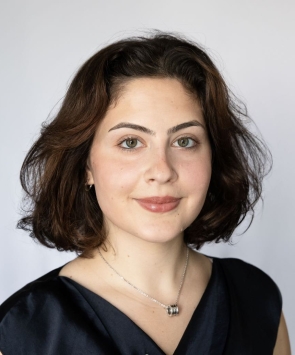
Andreamarie Efthymoiu
Home Country: United States of America (Dual Citizenship: Cyprus)
What motivated your decision to join the 1L Advocates Program at Columbia Law School?
While working in international law and diplomacy, I witnessed firsthand how useful the work of human rights-focused organizations was in coordinating research efforts, leading effective collaboration with civil society organizations, and facilitating global cooperation on human rights
advocacy. I seek to contribute to this kind of work early in my legal career, under the guidance of the foremost practitioners. The 1L Advocates Program is the ideal venue to do just that, providing its cohort with early exposure to different perspectives, mentorship, and the opportunity to work
alongside global NGOs - all of which are salient in one’s journey to become an effective and informed advocate.
What human rights issues do you care about? What work have you done before coming to Columbia?
My interest in human rights law stems from my Cypriot identity, which inspired me to question the efficacy of international legal systems as I observed the effects of displacement on two generations of Cypriots, their loss of fundamental human rights, and the lasting economic and sociopolitical effects of military aggression on one small island state. While working both in diplomacy and international arbitration, I have contributed to the progress made in protecting the rights of small sovereign states and their populations. At the permanent mission of Cyprus to the United Nations, I worked with diplomats and their counterparts in the
third and fourth General Assembly committees, as well as on the Commission on the Status of Women. As a paralegal at Foley Hoag, I had the opportunity to work on state submissions to the International Court of Justice on matters ranging from territorial integrity to climate change.
What do you hope to do when you graduate from Columbia?
As a Columbia Law graduate, I hope to continue my career in international law, with particular focus on public international law, the use of force, and human rights.
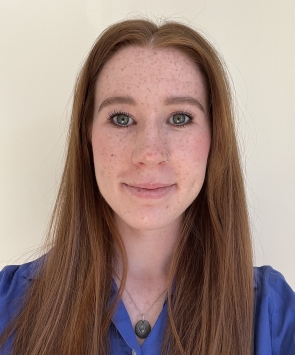
Annie McGovern
Home Country: United States of America
What motivated your decision to join the 1L Advocates Program at Columbia Law School?
I applied to law school with the intention of pursuing a career in human rights advocacy, so I was thrilled to be accepted into the 1LAP. The program offers students the unique opportunity to partake in humans rights curriculum immediately upon entering law school. I am extremely passionate about this work and eager to take advantage of any opportunity to engage in it. The 1LAP also boasts an impressive network of accomplished students, faculty, and professionals, all of whom I am excited to work alongside and learn from.
What human rights issues do you care about? What work have you done before coming to Columbia?
Given the intersectionality of all issues pertaining to human rights, I often find it difficult to narrow down my interests, but I typically gravitate towards projects that advance gender and racial equity in both the US and abroad. I was first introduced to the realm of international human rights when researching the Nagorno Karabakh conflict under the supervision of the University Network for Human Rights. My team traveled to Armenia to conduct a fact-finding mission and released a report outlining the ongoing abuses. Prior to this project, I advocated for Reproductive Justice by volunteering as an abortion doula, a sexual educator for high-schoolers, and as an intern with NARAL Pro-Choice. I also worked as a Domestic Violence Advocate in New York where I helped survivors access safe housing, governmental benefits, counseling, and other basic necessities in a trauma-informed manner.
What do you hope to do when you graduate from Columbia?
I envision myself traveling to sites of conflicts that receive less international media attention to learn about the needs of the community from those who are directly affected. I then hope to use people’s stories, with their consent, to create informative reports that spread awareness and hold leaders accountable for protecting their citizens. I also intend to take advantage of the United States’ privileged position on the world stage by garnering grassroots support across our country and placing further pressure on those in power. At a more general level, I picture a career in which I can combine my love for interpersonal connection and desire to help others with my interest in history, policy, and law. I hope to fulfill my dream of working at a non-profit, NGO, or governmental department that specifically serves the needs of women and children around the world.
Ebony Smith
Home Country: United States of America
What motivated your decision to join the 1L Advocates Program at Columbia Law School?
I was inspired by the 1L Advocates Program’s work in human rights, justice, and peace. I believe that it is vital to learn about and see the rest of the world, because it teaches us to value humanity and life. Realizing that we live in only a small section of the world that is intertwined with neighboring countries and communities, allows us to take accountability for our contributions to the global community.
What human rights issues do you care about? What work have you done before coming to Columbia?
I am invested in environmental justice. In our effort to combat climate change, we must center the most communities most impacted by housing insecurity, rising temperatures, and weakening infrastructure that is only made worse by frequent storms. These are often low-income, Black and Brown communities.
I care about solving grocery store droughts, making sure every city has safe drinking water, and preventing low-income communities from being the sites for dangerous landfills.
During my time as a pharmacy technician in Massachusetts, I worked in communities that often lacked health care and had little access to fresh food. I understand how environmental access impacts health.
What do you hope to do when you graduate from Columbia?
After graduating, I hope to one day advise international governments and domestic non-profit organizations in their talks of peace, diplomacy, and justice. I would also like to start my own practice.
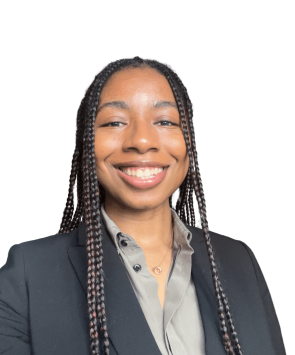
Io Owusu-Afari
Home Country: Ghana
What motivated your decision to join the 1L Advocates Program at Columbia Law School?
Careers in international humanitarian advocacy are so diverse and idiosyncratic that I couldn’t begin to imagine what mine might look like on my own. The 1L Advocates Program provides mentorship, exposure to different professionals and organizations in the field, and support of a like minded community which I hope will serve as a catalyst in my human rights journey.
What human rights issues do you care about? What work have you done before coming to Columbia?
My experiences growing up as a closeted queer person in Ghana have led me to care deeply about the health and safety of LGBTQ+ people globally, particularly in Africa. I am also passionate about educational equity and children’s rights. As an undergrad at Brown, I was a middle school summer program teacher through Generation Teach and taught incarcerated people as a Petey Greene Fellow. While living in New York, I worked with the Brooklyn Alumnae Chapter of my sorority to facilitate monthly mentorship sessions for young women in high schools, and helped to host food drives and organize neighbor support through my local mutual aid organization.
What do you hope to do when you graduate from Columbia?
Long-term I hope to build or work with an organization that promotes a network of queer advocates across the African continent and pushes for legal reform that affirms and protects LGBTQ+ rights.
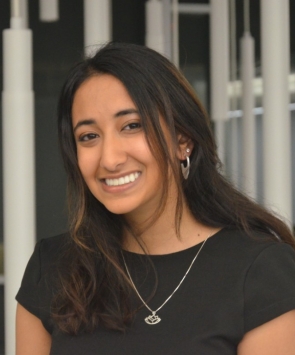
Ishani Mehta
Home Country: United States of America
What motivated your decision to join the 1L Advocates Program at Columbia Law School?
Upon joining Columbia Law School, I wanted to join the 1L Advocated Program because I fundamentally believe that community is integral to any and all public interest work. I am excited about the exposure to new career paths, modes of community engagement, role models, and like-minded peers that the 1LAP Fellows program offers, as well as the opportunity to grow my advocacy practice with structured guidance and mentorship from people within the law school and within the larger human rights community in New York.
What human rights issues do you care about? What work have you done before coming to Columbia?
As an undergraduate student, I worked in the Providence community with Housing Opportunities for People Everywhere to enable housing access for housing-insecure folks in the community. I was also a Bonner Fellow for the Providence Student Union, where I worked on campaigns like Counselors, Not Cops, which sought to decrease in-school arrests and replace armed SROs with mental health counselors, and Cook v. McKee, which was a case that sought to establish a Constitutional right to civics education in public schools. Since graduating, I have been a government consultant for the Office of Refugee Resettlement, Unaccompanied Children Bureau, where I worked with the Division of Program Management and Quality Improvement to implement trauma-informed care and redesign the safety monitoring processes for children undergoing the sponsor-vetting process.
What do you hope to do when you graduate from Columbia?
Upon graduating from Columbia, I aspire to work in seeking justice in cases of human rights abuses, particularly as they relate to international immigration and refugee migration and home-finding. I hope to one day work with the UNHCR or another organization doing global work.

Lara Hafez
Home Country: United States of America
What motivated your decision to join the 1L Advocates Program at Columbia Law School?
As a first generation student, I have struggled to find the best outlets to channel my desire to work in human rights since I never felt like I had anyone I could turn to
for advice or any programs that could offer guidance about what the future holds.
Fortunately, the 1L Advocates Program at Columbia Law School aligns seamlessly
with my aspirations because it offers a unique platform to deepen my understanding of human rights law through specialized seminars and practical experiences. Engaging with practicing advocates, faculty, and fellow students will provide invaluable mentorship and insights into diverse advocacy strategies. Moreover, the opportunity to collaborate with the Human Rights Clinic and contribute to public interest projects resonates deeply with my commitment to advancing justice for marginalized populations.
My goal is to leverage the Advocates Program's resources and mentorship to become a proficient advocate for marginalized communities, ensuring equitable access to justice. By immersing myself in this dynamic learning environment, I aim to cultivate the skills and knowledge necessary to navigate complex legal landscapes and understand how I can effectuate positive change.
What human rights issues do you care about? What work have you done before coming to Columbia?
As the daughter of Palestinian refugees, I am particularly drawn to the Palestinian
cause alongside immigrant and refugee rights. Much of my advocacy within
undergrad revolved around Palestinian rights as the president of our Students for
Justice in Palestine. I have also done on the ground work in Jordan by co-founding
an orphanage on the border of Jordan and Syria in an attempt to support Syrian
orphans fleeing the plight of their country during the Syrian Civil War. In addition
to this, I began working as a volunteer fundraiser to build water wells in
under-resourced communities within India and Bangladesh.
These initiatives have underscored my desire to support marginalized communities on an international scale and doing so in whatever capacity is possible. Additionally, I have always been interested in supporting women’s rights and have been able to support in a domestic setting by interning at a law firm for women where I would draft articles to inform clients about how to navigate claims they wanted to file and support them in the process.
What do you hope to do when you graduate from Columbia?
I am not entirely sure what I hope to do when I graduate. I do know I want
to be a human rights lawyer and hope to explore through this program how
I can best serve marginalized communities, whether that be through local
clinics or NGOs.
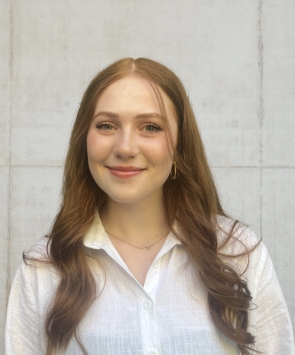
Madigan Ruch
Home Country: Canada (Toronto)
What motivated your decision to join the 1L Advocates Program at Columbia Law School?
I view the 1L Advocates Program as an excellent opportunity to apply the legal frameworks and reasoning skills I am developing in the classroom to direct-service work, and in doing so, explore my interests and potential paths within the human rights and social justice space early on in my law school career. What’s more, while most of my work to date has been focused on more niche, local communities, I recognize how the human rights issues of all marginalized groups, both locally and internationally, are fundamentally interconnected under broader systems of oppression; as such, the diverse viewpoints of those involved with 1LAP will enable me to collaborate with a community of motivated talented future leaders, and leverage our collective experiences and perspectives to instigate more robust reform policies across the human rights field.
What human rights issues do you care about? What work have you done before coming to Columbia?
My time as a support worker at a domestic violence refuge, and later in a transitional housing program for women exiting the prison system or psychiatric care, has exposed me to the uniquely precarious circumstances that mentally ill individuals face in navigating the justice system. Through my work, I was continually reflecting on what it means to uphold principles of autonomy, agency, and dignity in practice, and how the increased vulnerability plus lack of resources available to clients with cognitive impairments further complicates the ability to obtain informed consent. What’s more, I have been exposed to situations in which it seems respecting a client’s autonomy stands in tension with an advocate’s responsibility to intervene when a decision poses a direct harm. While there is no single clear solution to such complex legal challenges, my service work has imparted an understanding of the importance of holistic and multidisciplinary support; as I enter the legal profession, I intend to remain committed to collaborate with not only other jurists, but across healthcare, social work, and policy disciplines to provide more comprehensive, culturally sensitive, and robust advocacy.
What do you hope to do when you graduate from Columbia?
Upon graduation, I intend to dedicate my career to representing individuals with mental illness who have been victimized and deprived of their most basic rights to autonomy, property, and privacy by our social and government institutions through forcible retention and treatment, problematic conservatorships, and the epidemic of abuse within psychiatric and long-term care homes along with the prison system. After some time working in the public interest sector, I would love the opportunity to further my studies through a PhD before pursuing a career as a clinical law professor. In this role, I would be able to both continue work in direct-client service while also exposing the next generation of lawyers to the importance of mental health legal advocacy and reform!
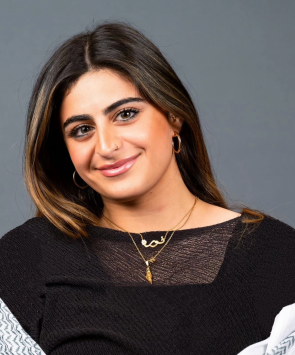
Noor Taher Abualhawa
Home Country: Palestine and United States of America
What motivated your decision to join the 1L Advocates Program at Columbia Law School?
Devoting my career to public interest work has long been my ambition. As the first in my family to attend law school, I have the unique chance to pave the way for others like myself and offer a diverse perspective to my program. Entering this field with less background knowledge than many, I will rely heavily on Columbia Law’s resources and support to build a strong foundation. The 1L Advocates
Program, with its early mentorship opportunities, is crucial to this. I am driven by a passion for human rights and the belief that law can effect real change. The prospect of engaging deeply in human rights work beginning in my very first year in law school and forming relationships with experienced mentors makes the 1L Advocates Program an invaluable opportunity.
What human rights issues do you care about? What work have you done before coming to Columbia?
I am passionate about researching the ways in which human rights both do and do not exist on an international scale, specifically in the Middle East. As a Palestinian, I have long witnessed human rights abuses plague the Arab World, often at the hands of other world powers. I am interested in studying the active limitations of international human rights law, why those limitations exist, and how we may work to overcome them to create a human rights system that offers tangible protections to populations around the globe. I am drawn to research on state-sponsored human rights violations in particular. Before joining Columbia Law, I worked in politics, public policy, and workers rights protections.
What do you hope to do when you graduate from Columbia?
Lawyers importantly engage in human rights monitoring, researching, and fact-finding missions. Although I am interested in human rights research in particular, I look forward to the exposure I will get of the human rights field at-large through the 1L Advocates Program and my time at Columbia Law.
Paola Ripoll Nuño
Home Country: United States of America
What motivated your decision to join the 1L Advocates Program at Columbia Law School?
I’m fortunate to start law school with extensive experience in human rights work, both within traditional legal settings and also entirely outside of the legal field. I’ve fallen into these experiences quite serendipitously, however, and I still feel that I have a murky understanding of how exactly to mold them into a viable career. Compared to other legal practice areas, human rights law is rather niche and non-traditional, and while I find the varied career paths of human rights attorneys exciting and promising, entering this field is also a daunting undertaking, especially as a first generation student. I was drawn to the 1L Advocates Program for the practical resources and training, as well as the access to peers and mentors with similar aspirations, that it provides right from the beginning of one’s time at Columbia Law.
What human rights issues do you care about? What work have you done before coming to Columbia?
As an undergraduate, I studied and worked abroad extensively, wrote two theses that focused on state-building and social movements in Latin America, and assisted with an internal investigation at the United Nations, experiences that oriented me to think about how we can ensure that international humanitarian work actually carries out its intended effect. Since graduating, I worked as a paralegal at a law firm, where I gained experience within the environmental department, focusing
on corporate sustainability issues, and within the pro bono department, assisting with immigration matters such as visa extensions, humanitarian parole, asylum, and VAWA cases. As a member of an international grassroots nonprofit, I’ve concurrently worked on cultural, ecological, and educational initiatives to provide relief to communities heavily impacted by climate change in western Uzbekistan. I’m excited to continue exploring issues such as climate change, environmental justice, nonprofit governance and oversight, and the interplay between civil society, government, and legal practitioners in law school.
What do you hope to do when you graduate from Columbia?
Upon graduating from Columbia Law, I hope to have as varied and global of a career as I’ve had prior to my matriculation. Even from my experiences prior to law school, I have seen the transformative potential of work done at the intersection of grassroots activism, culture and art, and more traditional legal avenues; I hope that in my legal career, I will be able to liaise with governmental, non-governmental, and private actors to affect societal change. I believe that a multidisciplinary approach to the practice of law, along with the establishment of genuine partnerships with the communities we intend to serve, will strengthen the ability of the legal
profession to work in social justice and advance human rights. My intention is to have a career that involves both practicing as a lawyer and working in research and academia.
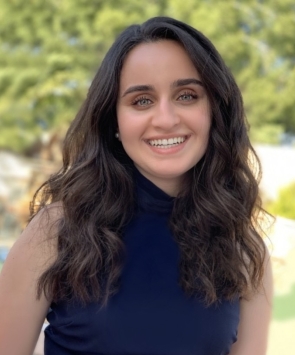
Renata Shammo
Home Country: United States of America
What motivated your decision to join the 1L Advocates Program at Columbia Law School?
I plan to pursue a career in international human rights law and spent my time as an undergraduate exploring different pathways to engage in human rights work. This exploration process was helpful but largely self-guided. I believe that the guidance the 1L Advocates Program provides will significantly broaden my awareness of the ways through which I can pursue human rights advocacy, thereby enabling me to make better informed career decisions. I also look forward to gaining human rights work experience through 1LAP, immersing myself in expert discourse about emerging human rights issues, and engaging in Columbia and broader New York’s vibrant human rights community as early as 1L year.
What human rights issues do you care about? What work have you done before coming to Columbia?
I have a strong interest in the rights of women in the Middle East, particularly the right to quality education. During university, I undertook a variety of public interest roles, including those in political campaigns, NGOs, and public interest law firms, and I experimented with researching, writing about, and disseminating information regarding human rights issues. Upon graduation, I moved to Japan and spent two years teaching English at elementary and junior high schools in Oita prefecture.
What do you hope to do when you graduate from Columbia?
I hope to dedicate my career to protecting civil liberties and increasing access to quality education around the world. I plan to use opportunities like 1LAP to better determine how I can best promote these causes, whether that be as a lawyer at a law firm, an NGO, or the government.
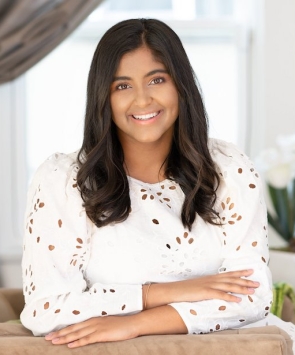
Ria Kanani
Home Country: United States of America
What motivated your decision to join the 1L Advocates Program at Columbia Law School?
My motivation to join the 1L Advocates Program at Columbia Law School is rooted in my commitment to human rights and my goal of building a national public interest law firm for survivors of sexual harassment. My advocacy journey began at Santa Clara County’s Office on Women’s Policy, where I organized community conferences on human trafficking. This experience ignited my passion for addressing gender-based violence.
At Georgetown's School of Foreign Service, I expanded my perspective on global human rights issues, reinforcing my dedication to international justice. Working at a family law firm specializing in Minor’s Counsel cases has further solidified my focus on a victim-centered approach, particularly for children.
At the U.S. Department of Justice's Office on Violence Against Women, I led a project improving juvenile court resources for VAWA victims. The 1L Advocates Program offers a unique opportunity to deepen my understanding of human rights law and connect with like-minded peers and mentors, crucial for achieving my career goals.
What human rights issues do you care about? What work have you done before coming to Columbia?
I am deeply committed to addressing gender-based violence, particularly sexual harassment and human trafficking. My journey in human rights advocacy began at Santa Clara County’s Office on Women’s Policy, where I organized community conferences and led workshops on human trafficking. These early experiences ignited my passion for addressing systemic issues surrounding gender-based violence and human trafficking. In my undergraduate studies at Georgetown's School of Foreign Service, I expanded my perspective to a global lens, realizing the interconnectedness of human rights issues across borders. I focused on understanding how local injustices can ripple into global crises, further solidifying my commitment to advocating for justice on an international scale.
For the past five years, I have worked at a family law firm specializing in Minor’s Counsel cases. My experiences there have shown me the importance of addressing systemic issues and advocating for marginalized communities. They have also reinforced my dedication to using a victim-centered approach to amplify the voices of sexual harassment survivors, particularly children. At the U.S. Department of Justice's Office on Violence Against Women (OVW), I have overseen federal funding allocation to improve juvenile court resources for VAWA victims. I spearheaded a project on the intersection of juvenile court and domestic violence, drawing conclusions that addressing underlying trauma is more effective than punitive measures in fostering behavioral change. The recommendations outlined in my report will be implemented in Justice For Families' FY-25 solicitation.
These experiences have shaped my commitment to advocating for the rights of children, women, and underrepresented minorities. I look forward to furthering this work through the Human Rights Institute 1L Advocates Program at Columbia Law School.
What do you hope to do when you graduate from Columbia?
Upon graduating from Columbia Law School, I aim to build a national public interest law firm dedicated to using a victim-centered approach to advocate for survivors of sexual harassment. My goal is to create a firm with practice groups specializing in various iterations of sexual abuse, providing comprehensive support to survivors and ensuring their voices are heard in the legal system. I plan to use the education and network I gain from Columbia Law School to advance these efforts on a national scale.
In addition to building a law firm, I hope to continue working on policy initiatives that address the root causes of gender-based violence and promote systemic change. My experience at the DOJ has shown me the impact that well-crafted policies can have on improving the lives of survivors. I plan to leverage my legal expertise and network to influence policy development and implementation, ensuring that survivors of sexual harassment receive the support and justice they deserve.

Sarahi Rivas
Home Country: United States of America
What motivated your decision to join the 1L Advocates Program at Columbia Law School?
The 1L Advocates Program aligns perfectly with my professional aspirations, given my commitment to a legal career in immigration law, by affording me the opportunity to engage with a network of similar goal-oriented individuals. As a first-generation college and professional student, I believe the mentoring services offered by 1LAP would play an essential role in easing my transition into law school and in preparing me
for a career as an attorney who aims to amplify the voices of marginalized members of my Latine community and others alike. As someone who values community building and thrives in a collaborative environment, I believe the 1LAP program offers an abundance of possibilities to work alongside others in advocating for the rights of underserved and underrepresented communities.
What human rights issues do you care about? What work have you done before coming to Columbia?
My experiences as a Chicana with immigrant parents have instilled in me the desire to amplify the voices of those rendered invisible by a system built against them. During my senior year at Cornell, I worked with Professor Beth Lyon as an interpreter for the Farmworker Legal Assistance Clinic at Cornell Law School and the planning committee for the LatCrit 2023 Biennial Conference. The LatCrit Biennial Conference aims to introduce the Latina/o perspective in critical race theory in legal education. I interpreted for our presenter, Crispin Hernandez, an activist farmworker. Succeeding his presentation, I interpreted between him and a Farmworker Legal Assistance Clinic law student. I gained
insight into his legal matter and afforded comfort, assuring him of our commitment to support him. It was such a memorable experience; we found ourselves laughing and conversing amidst tense circumstances. The resilience of the people I have interacted with further propels me to offer compassionate services as an immigration attorney.
What do you hope to do when you graduate from Columbia?
After Columbia, I hope to work in immigration law, focusing on supporting and uplifting my Latine community and others in need. I plan to use my legal education to advocate for equitable immigration policies and provide direct assistance to individuals navigating the complex immigration system. My goal is to offer compassionate and culturally informed legal services, ensuring that marginalized voices are heard and respected.
Wassa Bagayoko
Home Country: United States of America and Mali
What motivated your decision to join the 1L Advocates Program at Columbia Law School?
I’ve always been passionate about human rights but I’ve recently been unclear about what this career would look like. The advocates program gives me a space to connect with like minded students and be exposed to the variety of professionals in human rights. Being surrounded by people who are also passionate about bettering our world will be my rock this fall, and I am very much looking forward to the program.
What human rights issues do you care about? What work have you done before coming to Columbia?
As an undergraduate, I worked on local gun violence prevention legislation in Rhode Island and volunteered for an environmental justice group, No Liquefied Natural Gas in Providence. These experiences really shaped my understanding of how the institutional shapes the interpersonal, and how the law can help or hinder movements. I am also interested in education, particularly for marginalized people. My personal passions primarily lay in the intersection of human rights and climate change, specifically forced climate migration. As the child of Malian immigrants, I am always thinking about how climate change shapes human movement, how we think about this movement, and the ways in which climate change amplifies existing inequities.
What do you hope to do when you graduate from Columbia?
I hope to continue to remain engaged in my education nonprofits and build a new relationship with a local NGO, preferably one that focuses on the environment or immigration. Immediately after CLS, I hope to begin an experience that gives me the most rigorous legal training I can get, and use these skills to further support the communities I care for.
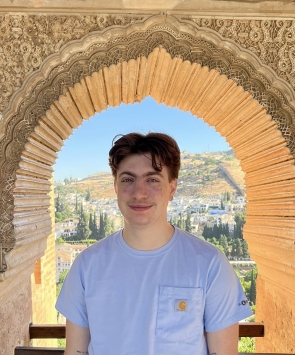
Will Damarjian
Home Country: United States of America
What motivated your decision to join the 1L Advocates Program at Columbia Law School?
Columbia Law has a reputation for focusing on ‘big law’ and the 1L course lacks specific
engagement with human rights issues, so it is important for me to find opportunities to learn more about human rights law. The 1L Advocates Program provides a community of students who share my values and the professional opportunities to learn the skills needed to best serve my future clients. I am especially interested in the opportunity for hands-on human rights work.
What human rights issues do you care about? What work have you done before coming to Columbia?
I am particularly interested in migrant and LGBTQ issues. Human rights frameworks
are often invoked to justify American domination and foreign policy that violates the sovereignty of other nations. I am interested in alternative approaches to human rights which respect the autonomy of marginalized individuals and recognize the need to address colonialism, capitalism, and imperialism in human rights work. Before attending Columbia I worked as a community organizer on LGBTQ and labor issues in my home state of Utah and then London, UK where I have lived for the past five years.
What do you hope to do when you graduate from Columbia?
My goal is to work as an immigration lawyer representing LGBTQ clients who not only need understanding representation but someone who recognizes the ways gender and sexual difference create paperwork discrepancies and other difficulties when navigating the United States immigration system.
Current Student Leadership:

Safia Southey
Home Country: United States of America
What motivated your decision to join the 1L Advocate Program Student Leadership cohort at Columbia Law School?
Coming to law school, I knew I wanted to study international human rights, but had an incredibly hard time finding people who had the same interests as me. However, ILAP provided me with the ideal community, advisors, and guidance that I needed to grow at Columbia. As a 2L, I wanted to support first year students in developing their interests, resources, and circles to help them thrive in law school beyond.
What human rights issues do you care about? What work have you done before coming to Columbia?
I am passionate about post-conflict justice, such as financial reparations, mental health support for survivors of human rights abuses, and non-punitive accountability mechanisms. Before Columbia, I worked for a variety of organizations, including UNRWA, the World Bank, the US State Department, the Public International Law and Policy Group, and the African American Redress Network. My work has primarily focused on the topics of environmental justice, transitional justice, human rights, and reparations, with a focus on the Middle East.
What do you hope to do when you graduate from Columbia?
After graduation, I hope to continue my work in post-conflict justice, perhaps with groups such as ICTJ, Human Rights Watch, or Amnesty International. I am interested in the intersection of law, policy, and advocacy, and am hoping to push the human rights field to ensure that programs are led by rightsholders and community-driven.
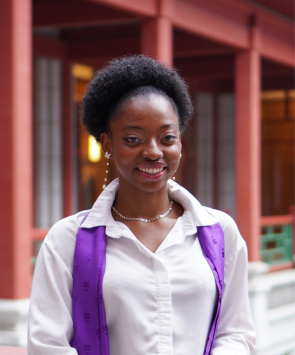
Melody Dodoo
Home Country: Accra, Ghana; Silver Spring, Maryland
What motivated your decision to join the 1L Advocate Program Student Leadership cohort at Columbia Law School?
In 1L I was searching for opportunities to engage in human rights work, and 1LAP presented the perfect opportunity to expand my knowledge of the human rights field. It also provided opportunities to network with Professors, faculty and staff, and find a community of like-minded students who were invested in the human rights field. Being in 1LAP was one of the most fulfilling programs of my 1L career.
What human rights issues do you care about? What work have you done before coming to Columbia?
I am most passionate about women’s and LGBTQ+ rights, particularly in the non-Western world.
What do you hope to do when you graduate from Columbia?
After graduating, I hope to engage in pro bono opportunities while working at a global firm. Following that, I hope to engage in human rights work at the international level.
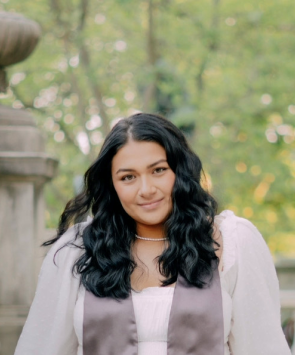
Abigail Carbajal
Home Country: United States of America
What motivated your decision to join the 1L Advocate Program Student Leadership cohort at Columbia Law School?
1LAP was one of the highlights of Abbey's 1L experience. She joined the student leadership team to help foster a similar experience and expose 1Ls to various human rights issues.
What human rights issues do you care about? What work have you done before coming to Columbia?
She is particularly interested in how opaque financial structures facilitate how these actors commit human rights abuses. Last summer, Abbey worked at the Organization of American States and at the Center for Justice and International Law, where she worked on matters related to freedom of expression, enforced disappearances, and extrajudicial killings.
What do you hope to do when you graduate from Columbia?
Following graduation, Abbey hopes to go to a plaintiff-side firm to work on corporate accountability matters.
